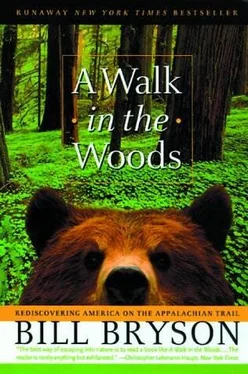Bill Bryson - A Walk In The Woods
Здесь есть возможность читать онлайн «Bill Bryson - A Walk In The Woods» весь текст электронной книги совершенно бесплатно (целиком полную версию без сокращений). В некоторых случаях можно слушать аудио, скачать через торрент в формате fb2 и присутствует краткое содержание. Жанр: Современная проза, на английском языке. Описание произведения, (предисловие) а так же отзывы посетителей доступны на портале библиотеки ЛибКат.
- Название:A Walk In The Woods
- Автор:
- Жанр:
- Год:неизвестен
- ISBN:нет данных
- Рейтинг книги:4 / 5. Голосов: 1
-
Избранное:Добавить в избранное
- Отзывы:
-
Ваша оценка:
- 80
- 1
- 2
- 3
- 4
- 5
A Walk In The Woods: краткое содержание, описание и аннотация
Предлагаем к чтению аннотацию, описание, краткое содержание или предисловие (зависит от того, что написал сам автор книги «A Walk In The Woods»). Если вы не нашли необходимую информацию о книге — напишите в комментариях, мы постараемся отыскать её.
A Walk In The Woods — читать онлайн бесплатно полную книгу (весь текст) целиком
Ниже представлен текст книги, разбитый по страницам. Система сохранения места последней прочитанной страницы, позволяет с удобством читать онлайн бесплатно книгу «A Walk In The Woods», без необходимости каждый раз заново искать на чём Вы остановились. Поставьте закладку, и сможете в любой момент перейти на страницу, на которой закончили чтение.
Интервал:
Закладка:
From the valley floor, we had 3,700 feet of climb, 2,000 feet of it in the first two miles, and three smaller peaks en route-Mount Liberty, Little Haystack, and Mount Lincoln-but it was a splendid morning, with mild but abundant sunshine and that invigorating, minty-clean air you get only in northern mountains. It had the makings of a flawless day. We walked for perhaps three hours, talking little because of the steepness of the climb but enjoying being out and keeping a good pace.
Every guidebook, every experienced hiker, every signboard beside every trailhead parking lot warns you that the weather in the White Mountains can change in an instant. Stories of campers who go for a stroll along sunny heights in shorts and sneakers only to find themselves, three or fours hours later, stumbling to unhappy deaths in freezing fog are the stuff of every campfire, but they are also true. It happened to us when we were a few hundred feet shy of the summit of Little Haystack Mountain. The sunshine abruptly vanished, and from out of nowhere a swirling mist rolled into the trees. With it came a sudden fall in temperature, as if we had stepped into a cold store. Within minutes the forest was settled in a great foggy stillness, chill and damp. Timberline in the White Mountains occurs as low as 4,800 feet, about half the height in most other ranges, because the weather is so much more severe, and I began to see why. As we emerged from a zone of krummholz, the stunted trees that mark the last gasp of forest at treeline, and stepped on to the barren roof of Little Haystack, we were met by a stiff, sudden wind-the kind that would snatch a hat from your head and fling it a hundred yards before you could raise a hand-which the mountain had deflected over us on the sheltered western slopes but which here was flying unopposed across the open summit. We stopped in the lee of some boulders to put on waterproofs, for the extra warmth as much anything, for I was already quite damp from the sweat of effort and the moist air-a clearly foolish state to be in with the temperature falling and the wind whisking away any body heat. I opened my pack, rooted through the contents, and then looked up with that confounded expression that comes with the discovery of a reversal. I didn’t have my waterproofs. I rooted again, but there was hardly anything in the pack-a map, a light sweater, a water bottle, and a packed lunch. I thought for a moment and with a small inward sigh remembered pulling the waterproofs out some days before and spreading them out in the basement to air. I hadn’t remembered to put them back.
Bill, tightening a drawstring on his windcheater hood, looked over. “Something wrong?”
I told him. He made a grave expression. “Do you want to turn back?”
“Oh, no.” I genuinely didn’t want to. Besides, it wasn’t that bad. There wasn’t any rain and I was only a little chilly. I put the sweater on and felt immediately better. Together we looked at his map. We had done almost all the height, and it was only a mile and a half along a ridgeline to Lafayette, at which point we would descend steeply 1,200 feet to Greenleaf Hut, a mountain lodge with a cafeteria. If I did need to warm up, we would reach the hut a lot faster than if we went five miles back down the mountain to the car.
“You sure you don’t want to turn back?”
“No,” I insisted. “We’ll be there in half an hour.”
So we set off again into the galloping wind and depthless gray murk. We cleared Mount Lincoln, at 5,100 feet, then descended slightly to a very narrow ridgeline. Visibility was no more than fifteen feet and the winds were razor sharp. Air temperature falls by about 2.5°F with every thousand feet of elevation, so it would have been chillier at this height anyway, but now it was positively uncomfortable. I watched with alarm as my sweater accumulated hundreds of tiny beads of moisture, which gradually began to penetrate the fabric and join the dampness of the shirt beneath. Before we had gone a quarter of a mile the sweater was wet through and hanging heavily on my arms and shoulders.
To make things worse, I was wearing blue jeans. Everyone will tell you that blue jeans are the most foolish item of clothing you can wear on a hike. I had contrarily become something of a devotee of them because they are tough and give good protection against thorns, ticks, insects, and poison ivy-perfect for the woods. However, I freely concede that they are completely useless in cold and wet. The cotton sweater was something I had packed as a formality, as you might pack antisnake bite medicine or splints. It was July, for goodness sake. I hadn’t expected to need any kind of outerwear beyond possibly my trusty waterproofs, which of course I didn’t have either. In short, I was dangerously misattired and all but asking to suffer and die. I certainly suffered.
I was lucky to escape with that. The wind was whooshing along noisily and steadily at a brisk twenty-five miles an hour, but gusting to at least double that, and from ever-shifting directions. At times, when the wind was head on, we would take two steps forward and one back. When it came from an angle, it gave us a stiff shove towards the edge of the ridge. There was no telling in the fog how far the fall would be on either side, but it looked awfully steep, and we were after all a mile up in the clouds. If conditions had deteriorated just a little-if the fog had completely obscured our footing or the gusts had gathered just enough bump to knock a grown man over-we would have been pinned down up there, with me pretty well soaked through. Forty minutes before, we had been whistling in sunshine. I understood now how people die in the White Mountains even in summer.
As it was, I was in a state of mild distress. I was shivering foolishly and feeling oddly lightheaded. The ridge seemed to run on forever, and there was no guessing in the milky void how long it would be till the form of Lafayette would rise to meet us. I glanced at my watch-it was two minutes to eleven; just right for lunch when and if we ever got to the godforsaken lodge-and took some comfort from the thought that at least I still had my wits about me. Or at least I felt as if I did. Presumably, a confused person would be too addled to recognize that he was confused. Ergo, if you know that you are not confused then you are not confused. Unless, it suddenly occurred to me-and here was an arresting notion- unless persuading yourself that you are not confused is merely a cruel, early symptom of confusion. Or even an advanced symptom. Who could tell? For all I knew I could be stumbling into some kind of helpless preconfusional state characterized by the fear on the part of the sufferer that he may be stumbling into some kind of helpless preconfusional state. That’s the trouble with losing your mind; by the time it’s gone, it’s too late to get it back.
I glanced at my watch again and discovered with horror that it was still only two minutes to eleven. My sense of time was going! I might not be able to reliably assess my faltering brain, but here was proof on my wrist. How long would it be till I was dancing around half naked and trying to beat out flames, or seized with the brilliant notion that the best way out of this mess would be to glide to the valley floor on a magic, invisible parachute? I whimpered a little and scooted on, waited a good full minute and stole a glance at my watch again. Still two minutes to eleven! I was definitely in trouble.
Bill, who seemed serenely impervious to cold and of course had no idea that we were doing anything but proceeding along a high ridge in an unseasonal breeze, looked back from time to time to ask how I was doing.
“Great!” I’d say, for I was too embarrassed to admit that I was in fact losing my mind preparatory to stepping over the edge with a private smile and a cry of “See you on the other side, old friend!” I don’t suppose he had ever lost a patient on a mountaintop, and I didn’t wish to alarm him. Besides, I wasn’t entirely convinced I Was losing my grip, just severely uncomfortable.
Читать дальшеИнтервал:
Закладка:
Похожие книги на «A Walk In The Woods»
Представляем Вашему вниманию похожие книги на «A Walk In The Woods» списком для выбора. Мы отобрали схожую по названию и смыслу литературу в надежде предоставить читателям больше вариантов отыскать новые, интересные, ещё непрочитанные произведения.
Обсуждение, отзывы о книге «A Walk In The Woods» и просто собственные мнения читателей. Оставьте ваши комментарии, напишите, что Вы думаете о произведении, его смысле или главных героях. Укажите что конкретно понравилось, а что нет, и почему Вы так считаете.












